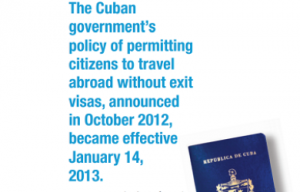 The Cuban government’s policy of permitting citizens to travel abroad without exit visas, announced in October 2012, becomes effective January 14, 2013. According to Granma, the newspaper operated by the Communist party, Cuban citizens will only have to show their passport and a visa from the country to which they are traveling after the new policy becomes effective. The measure will also extend the amount of time Cubans are permitted to remain abroad from 11 months to 24 months, with the opportunity to request an extension, before they lose residency, education, social security and health care benefits.
The Cuban government’s policy of permitting citizens to travel abroad without exit visas, announced in October 2012, becomes effective January 14, 2013. According to Granma, the newspaper operated by the Communist party, Cuban citizens will only have to show their passport and a visa from the country to which they are traveling after the new policy becomes effective. The measure will also extend the amount of time Cubans are permitted to remain abroad from 11 months to 24 months, with the opportunity to request an extension, before they lose residency, education, social security and health care benefits.
The news was met with delight in Havana, USA Today reports:
“No! Wow, how great!” said Mercedes Delgado, a 73-year-old retiree when told of the news that was announced overnight. “Citizens’ rights are being restored.”
“Look, I ask myself how far are we going to go with these changes. They have me a little confused because now all that was done during 50 years, it turns out we’re changing it,” said Maria Romero, a cleaning worker who was headed to her job Tuesday morning. “Everything they told us then, it wasn’t true. I tell you, I don’t understand anything.”
Cuba-born U.S. Rep. Ileana Ros-Lehtinen referred to the measure as “so-called reforms” that are “nothing more than Raul Castro’s desperate attempts to fool the world into thinking that Cuba is changing.
The government declares the change “an irreversible process of normalization of relations between emigrants and their homeland.” However, the decree still imposes limits on travel by many Cubans. People facing criminal charges cannot obtain a passport, let alone travel abroad, without permission. Government detractors have long been prevented from obtaining exit visas, and, under the new policy, the government can deny passports if issuing them would “affect national security.” Doctors, scientists and military personnel, along with other professionals considered too valuable to risk losing, are still restricted. Travelers also must obtain visas from the countries to which they intend to travel. Commentators fear that the government continue to limit travel in the future as it has done in the past by denying passports to those seeking to travel abroad, where previously the exit visa application would have been denied.
Read full article here: CABA Briefs Winter 2013
Other Articles to read:

